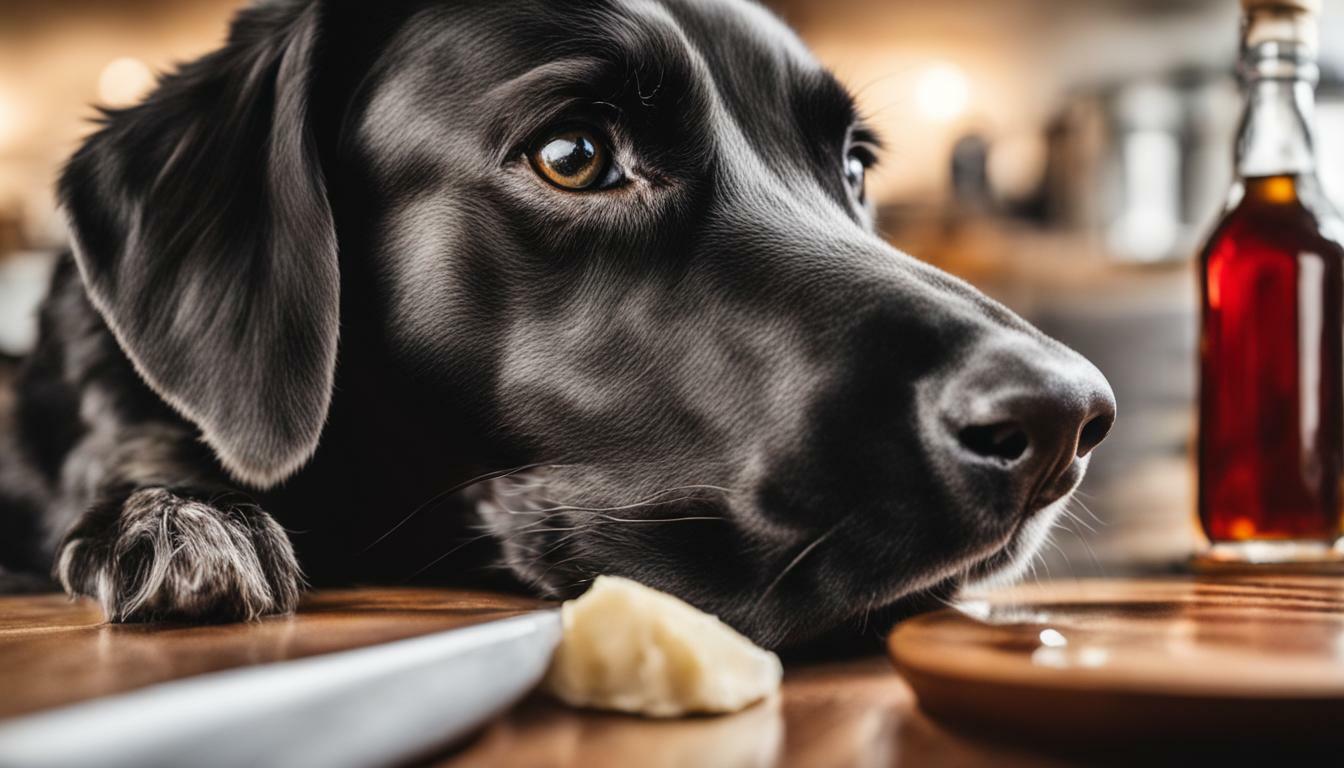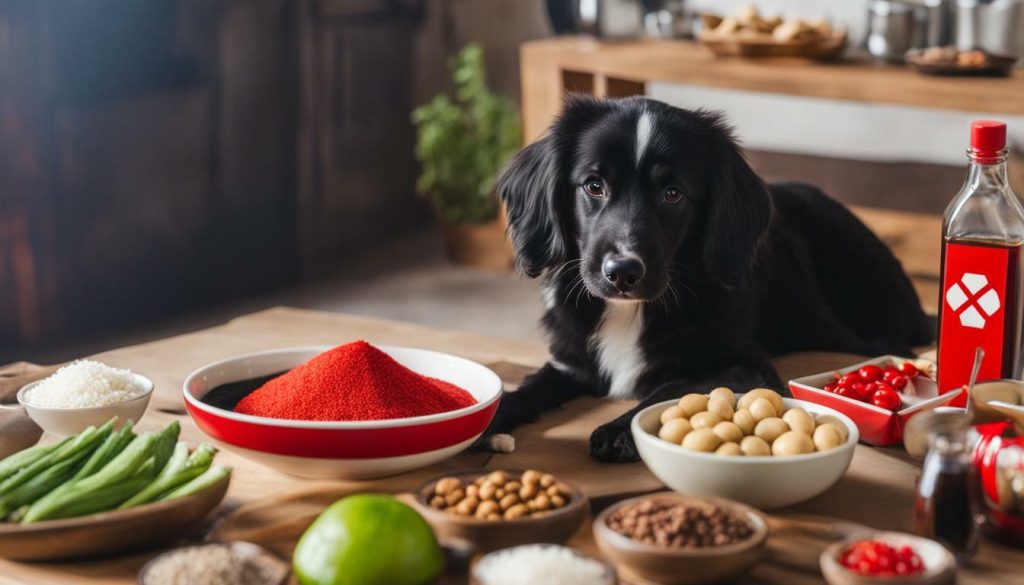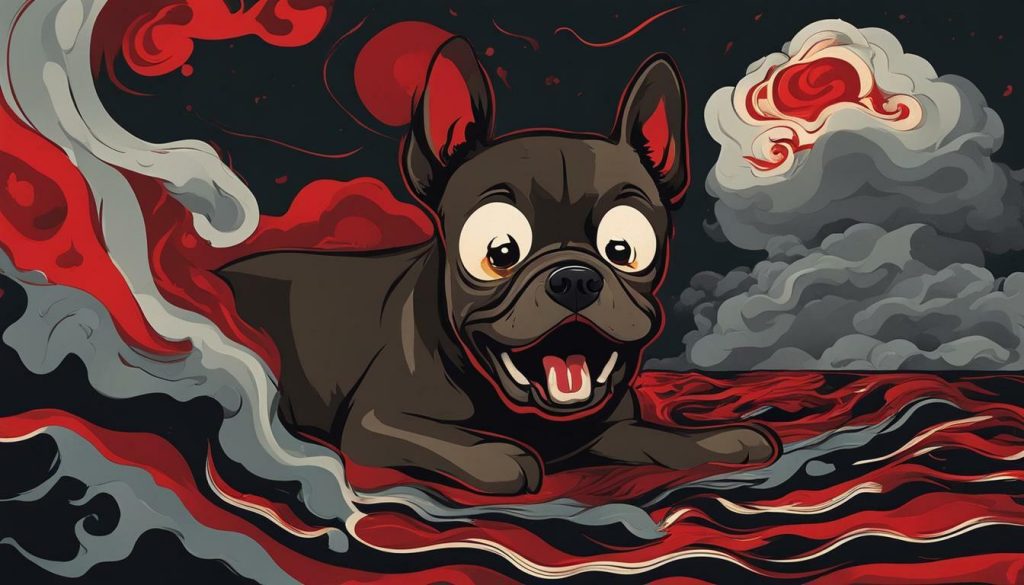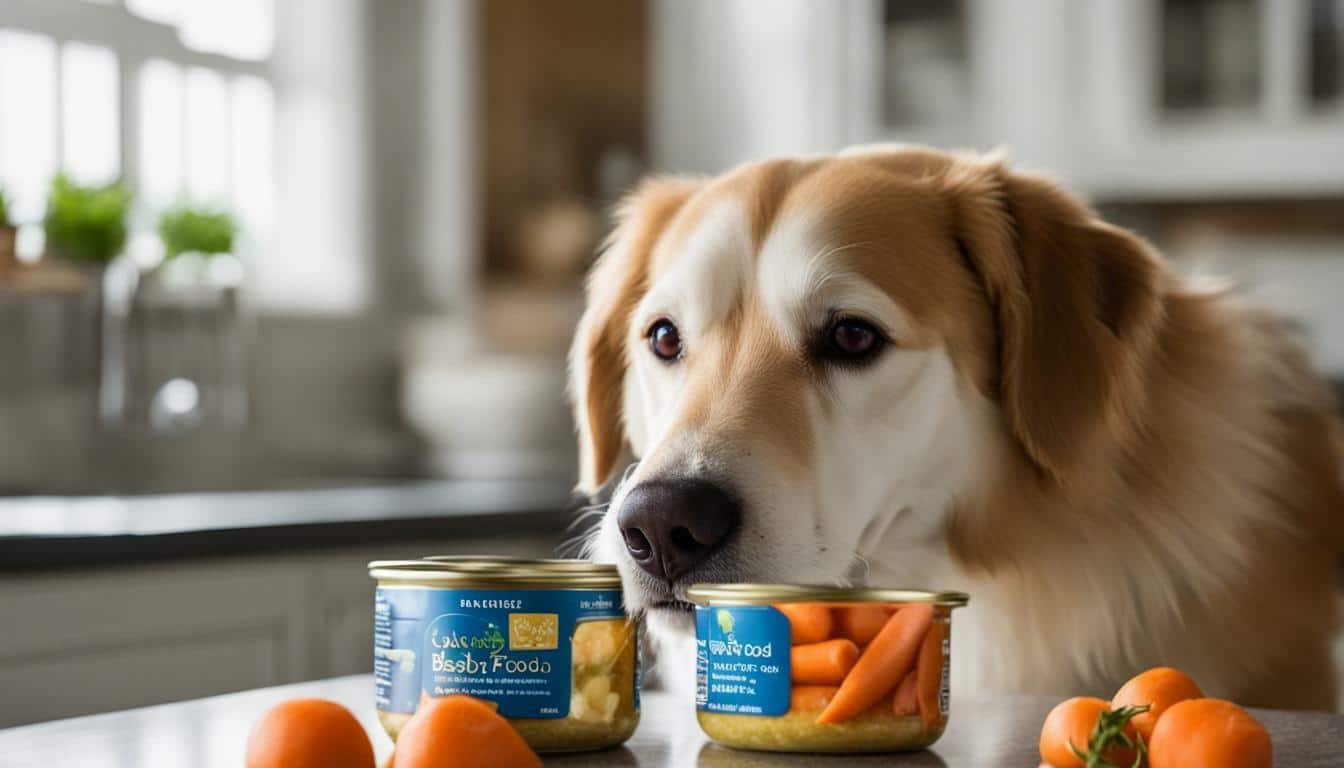
When it comes to including soy sauce in a dog’s diet, there are important factors to consider. While many human foods can be safe for dogs, soy sauce is not one of them. The high sodium content in soy sauce can be toxic to dogs and cause various health issues. As a professional journalist specializing in dog care, I decided to delve deeper into the topic of whether dogs can safely consume soy sauce. In my research, I discovered the potential risks and dangers associated with feeding soy sauce to dogs, as well as the importance of understanding their dietary needs.
Key Takeaways:
- Soy sauce is not safe for dogs to consume due to its high sodium content.
- A small amount of soy sauce can lead to salt poisoning or kidney failure in dogs.
- Symptoms of salt poisoning include excessive thirst, increased urination, diarrhea, vomiting, tremors, and seizures.
- Soy sauce may also contain garlic and onions, which are toxic to dogs in large amounts.
- It is important to monitor dogs for symptoms and seek veterinary treatment if they ingest soy sauce.
The Dangers of Soy Sauce for Dogs
Soy sauce poses several dangers to dogs due to its high sodium content. Even a small amount of soy sauce can lead to salt poisoning, kidney failure, and other serious health issues in dogs. Excessive salt intake can disrupt the delicate balance of electrolytes in their bodies and cause a range of symptoms.
One of the primary symptoms of salt poisoning in dogs is excessive thirst. They may also exhibit increased urination, diarrhea, and vomiting. In severe cases, dogs may experience tremors or seizures, which can be life-threatening. It is crucial to monitor any dog that has ingested soy sauce and seek immediate veterinary treatment if these symptoms occur.

Additionally, soy sauce often contains garlic or onions, both of which are toxic to dogs. These ingredients can cause gastrointestinal distress, anemia, and even damage to the dog’s organs. It is essential to be aware of the ingredients in soy sauce before giving it to your dog or using it in their meals.
To ensure the health and well-being of your furry companion, it is best to avoid giving dogs any type of seasoning, including soy sauce. Seasonings are not necessary for their diet and can pose significant risks to their health. Instead, focus on providing them with a balanced and nutritious diet that meets their specific dietary needs.
When introducing new foods to your dog’s diet, it is crucial to research the safety of those foods beforehand. Some foods that are safe for humans may be harmful or toxic to dogs. By staying informed and making educated decisions about your dog’s diet, you can help prevent any adverse reactions and keep them healthy.
| Symptoms of Salt Poisoning in Dogs | Symptoms of Garlic or Onion Toxicity |
|---|---|
|
|
Salt Poisoning Symptoms in Dogs
Salt poisoning in dogs can manifest through various symptoms that should not be ignored. Even a small amount of soy sauce, which is high in sodium, can lead to salt poisoning in dogs, resulting in serious health issues. Some common symptoms of salt poisoning in dogs include:
- Excessive thirst
- Increased urination
- Diarrhea
- Vomiting
- Tremors
- Seizures
These symptoms can be alarming and potentially fatal for dogs. If you suspect that your dog has ingested soy sauce or any other high sodium food, it is crucial to monitor them closely for any signs of salt poisoning.
| Symptoms | Treatment |
|---|---|
| Excessive thirst | Offer fresh water and encourage drinking to dilute sodium levels. Seek immediate veterinary attention if excessive thirst persists. |
| Increased urination | Monitor urine output. If your dog is not urinating or has difficulty urinating, contact your veterinarian. |
| Diarrhea | Keep an eye on your dog’s bowel movements. If diarrhea becomes severe or persists for more than 24 hours, consult with your veterinarian. |
| Vomiting | If your dog vomits, remove access to food and water for a few hours. Gradually reintroduce small amounts of water and a bland diet. If vomiting continues or your dog shows signs of distress, seek medical attention. |
| Tremors | Tremors may indicate neurological issues. Contact your veterinarian immediately for advice and a thorough examination. |
| Seizures | A seizure is a medical emergency. Keep your dog safe during the seizure and seek immediate veterinary care. |
“Salt poisoning can be life-threatening for dogs. If you suspect that your dog has ingested soy sauce or any other high sodium food, do not hesitate to contact your veterinarian. Early detection and treatment are crucial to prevent further complications and ensure your dog’s well-being.”
Remember, prevention is always better than cure when it comes to your dog’s health. It is best to avoid giving dogs any type of seasoning, including soy sauce. Prioritize their dietary needs by researching the safety of specific foods before feeding them to your furry friend.

Dogs should avoid soy sauce that contains garlic or onions, as these can be harmful to their health. Both garlic and onions are part of the Allium family of plants, which are known to be toxic to dogs.
Garlic contains a compound called thiosulfate, which can damage a dog’s red blood cells and lead to anemia. Onions, on the other hand, contain a substance called N-propyl disulfide, which can cause gastrointestinal distress and even damage to a dog’s internal organs.
If a dog ingests soy sauce that contains garlic or onions, it is important to monitor them for any signs of toxicity. Symptoms may include vomiting, diarrhea, weakness, loss of appetite, and abdominal pain. In severe cases, ingestion of garlic or onions can lead to more serious conditions, such as hemolytic anemia or organ failure.
| Garlic | Onions |
|---|---|
| Contains thiosulfate | Contains N-propyl disulfide |
| Can damage red blood cells | Can cause gastrointestinal distress |
| May lead to anemia | May cause organ damage |
It is important to note that the amount of garlic or onions present in soy sauce may vary depending on the brand or recipe. Even small amounts of these ingredients can be dangerous to dogs, especially if they are consumed regularly or in large quantities.
To ensure the safety of your furry friend, it is best to avoid giving them any food that contains soy sauce, garlic, or onions. Instead, opt for dog-friendly treats and meals that are specifically formulated to meet their dietary needs.
Monitoring and Seeking Veterinary Treatment
If a dog ingests soy sauce, it’s crucial to closely monitor their condition and take appropriate action. The high sodium content in soy sauce can lead to salt poisoning, which can have serious consequences for dogs. Symptoms of salt poisoning include excessive thirst, increased urination, diarrhea, vomiting, tremors, and seizures. These symptoms can indicate a dangerous buildup of sodium in the dog’s system, which can lead to kidney failure and other life-threatening complications.
It’s important to remember that even a small amount of soy sauce can be harmful to dogs, so it’s essential to be vigilant. If you suspect your dog has ingested soy sauce or is showing any signs of salt poisoning, it’s crucial to seek veterinary treatment immediately. A veterinarian will be able to assess the situation and provide the necessary treatment, which may include intravenous fluids to flush out the excess sodium and support the dog’s kidneys.
| Signs of Salt Poisoning in Dogs |
|---|
| Excessive thirst |
| Increased urination |
| Diarrhea |
| Vomiting |
| Tremors |
| Seizures |
Prevention is always better than cure, so it’s best to avoid giving dogs any type of seasoning, including soy sauce. When it comes to their diet, it’s important to prioritize their health and well-being. Researching the safety of specific foods before feeding them to dogs is essential. By being aware of the potential dangers and taking necessary precautions, we can ensure that our furry friends stay safe and healthy.

Disclaimer: The information in this article is for educational purposes only and does not replace professional veterinary advice. If you have any concerns about your dog’s health, please consult a veterinarian.
The Importance of Seasoning Awareness
It is essential to be cautious about the seasonings dogs consume, including soy sauce, to ensure their overall well-being. While soy sauce may be a staple in many human diets, it can pose serious risks to dogs. One of the main concerns is its high sodium content, which can be toxic to our furry friends.
Sodium is an essential mineral for dogs, but they require it in much smaller quantities compared to humans. Excessive sodium intake can lead to salt poisoning, causing symptoms such as excessive thirst, increased urination, diarrhea, vomiting, tremors, and even seizures. In severe cases, it can result in kidney failure or even death.
To avoid these risks, it is crucial to be mindful of the ingredients and seasonings used in our dogs’ food. This means steering clear of any seasonings, including soy sauce, that can potentially harm their health. Instead, opt for dog-friendly alternatives that are specifically formulated to meet their unique dietary needs.

By being aware of the seasonings we use in our dogs’ meals, we can help prevent unnecessary health complications. It is always a good practice to research the safety of specific foods and consult with a veterinarian if you are unsure about certain ingredients. Our dogs rely on us to make informed decisions that prioritize their well-being, and by doing so, we can ensure they lead happy and healthy lives.
Other Soy-Based Foods to Avoid
Apart from soy sauce, there are other soy-based foods that dogs should avoid for their health. While soy itself is not toxic to dogs, certain soy products can pose risks. One such food is tofu, a popular soy-based protein source among humans. While tofu can be a nutritious addition to a human diet, it is not suitable for dogs. It contains high levels of fat, which can lead to gastrointestinal upset and pancreatitis in dogs. Additionally, flavored or seasoned tofu products often contain ingredients like garlic and onions, which are toxic to dogs.
Another soy-based food to be cautious of is soy milk. While it may seem like a healthy alternative to cow’s milk, soy milk can cause digestive issues in dogs. It contains sugars that dogs have difficulty digesting, leading to diarrhea, gas, and bloating. Additionally, soy milk may contain additives or artificial sweeteners that are toxic to dogs. It is best to stick to water or appropriate canine milk substitutes for your dog’s hydration needs.
When it comes to dog treats, soy-based options should also be avoided. Many commercially available dog treats contain soy as a filler ingredient, which offers little nutritional value. These treats can lead to weight gain, allergies, and digestive issues in dogs. Instead, opt for treats made with high-quality protein sources like chicken or beef, or consider homemade treats using dog-friendly ingredients.
Remember, it is always important to prioritize your dog’s health and well-being when choosing their diet. If you have any questions or concerns about specific foods or ingredients, consult with your veterinarian for personalized guidance and recommendations.

The Importance of Researching Dog Diets
Before including any food in a dog’s diet, it is essential to conduct thorough research and make informed choices. This is especially true when it comes to seasonings like soy sauce. While it may seem harmless or flavorful to us, soy sauce can actually be harmful to dogs due to its high sodium content.
Dogs are more sensitive to salt than humans, and even a small amount of soy sauce can lead to salt poisoning or kidney failure in dogs. The symptoms of salt poisoning include excessive thirst, increased urination, diarrhea, vomiting, tremors, and seizures. It is crucial to monitor dogs who have ingested soy sauce for these symptoms and seek immediate veterinary treatment if needed.

Not only is the sodium content in soy sauce a concern, but the presence of garlic or onions in some soy sauces can also be toxic to dogs. These ingredients can cause gastrointestinal distress, anemia, and even organ damage in dogs. It is crucial to be aware of the ingredients in the seasonings and foods we feed our dogs to ensure their safety and well-being.
When it comes to a dog’s diet, it is best to err on the side of caution and avoid giving them any type of seasoning, including soy sauce. Instead, focus on providing them with a balanced and nutritious diet that meets their specific dietary needs. There are plenty of safe and suitable alternatives to soy-based seasonings that can add flavor to your dog’s meals without posing any health risks.
| Soy-Based Foods to Avoid | Safe Alternatives |
|---|---|
| Soy sauce | Unseasoned or homemade broths |
| Soy-based marinades | Herbs and spices approved for dogs |
| Soy-based dressings | Plain yogurt or cottage cheese |
By being mindful of what we feed our dogs and conducting thorough research on their dietary needs, we can ensure that they live long, healthy, and happy lives. It’s always better to be safe than sorry when it comes to our furry friends.
Conclusion
When it comes to the question of whether dogs can eat soy sauce, it is crucial to prioritize their health and well-being, and avoid giving them soy sauce due to its potential risks and harmful effects. Dogs should not consume soy sauce because it is high in sodium, which can be toxic to them.
Even a small amount of soy sauce, such as a teaspoon, can cause salt poisoning or kidney failure in dogs. The symptoms of salt poisoning include excessive thirst, increased urination, diarrhea, vomiting, tremors, and seizures. These can have serious consequences and potentially be fatal to dogs.
Furthermore, dogs may also suffer from toxicity and even death if the soy sauce contains garlic or onions, both of which are toxic to dogs in large amounts. It is important to remember that dogs have different dietary needs than humans, and certain ingredients that may be safe for us can be harmful to them.
If your dog accidentally ingests soy sauce, it is crucial to monitor them closely for any symptoms and seek immediate veterinary treatment if necessary. In general, it is best to avoid giving dogs any type of seasoning, including soy sauce, and to always research the safety of specific foods before feeding them to your furry friends.
Additionally, it is important to be aware of other soy-based foods that should be avoided when it comes to a dog’s diet. By prioritizing their health and well-being and making informed decisions about their dietary needs, we can ensure that our dogs stay happy and healthy.
FAQ
Can dogs safely eat soy sauce?
No, dogs should not eat soy sauce as it is high in sodium and can be toxic to them.
What are the dangers of feeding dogs soy sauce?
Feeding dogs soy sauce can lead to salt poisoning, kidney failure, and other serious health issues.
What are the symptoms of salt poisoning in dogs?
Symptoms of salt poisoning in dogs can include excessive thirst, increased urination, diarrhea, vomiting, tremors, and seizures.
Are garlic and onion in soy sauce toxic to dogs?
Yes, garlic and onion are toxic to dogs, and if present in the soy sauce, they can cause gastrointestinal distress, anemia, and organ damage.
What should I do if my dog ingests soy sauce?
It is important to monitor your dog for symptoms and seek veterinary treatment if necessary. Immediate attention is crucial to prevent any potential adverse reactions.
Should I avoid giving my dog any type of seasoning, including soy sauce?
Yes, it is best to avoid giving dogs any type of seasoning, including soy sauce. Dogs have different dietary needs and seasonings can cause harm or be toxic in larger amounts.
Are there any other soy-based foods I should avoid feeding my dog?
Yes, it is recommended to avoid other soy-based foods as well. It is important to research and choose foods that are safe and suitable for your dog’s health and well-being.
Why is it important to research dog diets?
Researching dog diets helps ensure that you are making informed decisions about what foods are safe and suitable for your dog. It prioritizes their health and can prevent potential harm.






